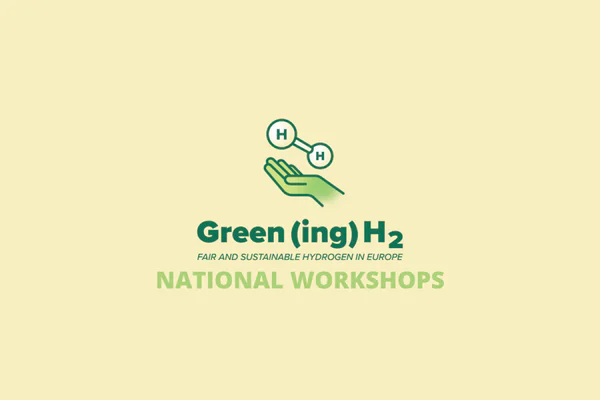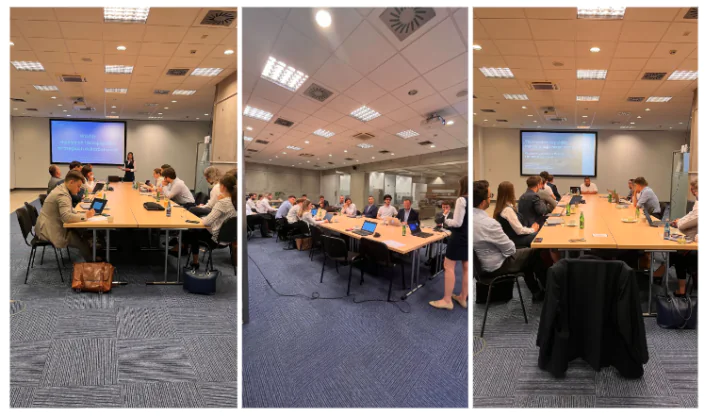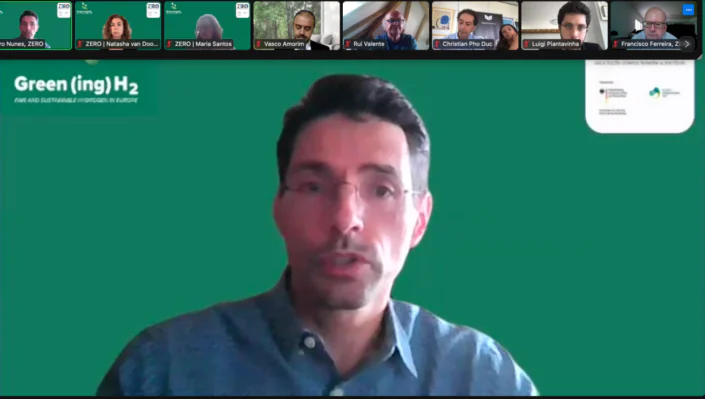Green(ing) H2: National Workshops
Green(ing) H2 is a European Climate Initiative (EUKI) funded project that partners 3 European NGOs – Instrat Foundation (Poland), Germanwatch (Germany) and ZERO (Portugal) focused on promoting green Hydrogen to achieve climate neutrality by engaging civil society to make Europe’s H2 infrastructure green, fair and sustainable.

1st Workshop: The role of hydrogen in the Polish energy transition
(Instrat Foundation, Poland)
29 June 22 | Agenda
#registered: 23
#attendees: 20
#panellists: 4
In the in-person workshop organised by the Instrat Foundation, the panelists, including Ewa Mazur, Michał Smoleń, Tobiasz Adamczewski, and Tomoho Umeda, along with other guests from both the public and private sectors, have thoroughly discussed the role of hydrogen in the Polish energy transition.

Some key issues addressed in the workshop were, among others, the comparison and analysis of several EU member states hydrogen strategies, the shape of present and future Polish hydrogen market, the place of hydrogen and biomethane in the 2050 Polish economy, the international hydrogen trade, as well as the pressing challenges of the developing hydrogen economy from the industry perspective.
The Instrat Foundation would like to thank all the attendees for their participation and invaluable contributions to the hydrogen discourse in Poland. The workshop is bound to be a stepping stone towards greater inclusion of civil society in the acceleration of the hydrogen economy development.
2nd Workshop: Accelerating the hydrogen ramp-up – blind spot hydrogen infrastructure
(Germanwatch & DNR, Germany)
4 July 22 | Agenda
#registered: 18
#attendees: 17
#panellists: 3
In the live workshop hosted on July 4, 2022, Germanwatch and Deutscher Naturschutzring (DNR) discussed together with other German civil society organisations, think tanks and scientific institutes whether further delays in building up hydrogen infrastructure constitute a challenge for building up a fair and green hydrogen market in Europe. Such delays could be exacerbated by the currently strong focus on liquified natural gas (LNG) infrastructure.
After scientific inputs on options and challenges regarding pipeline transport, shipping and storage of hydrogen, we discussed civil society’s role and positions in the debate around hydrogen infrastructure and came to the following conclusions:
- Hydrogen infrastructure is necessary in order to link production and consumption centres and enable cross-border hydrogen trade in Europe and beyond. Starting by building up a no-regret hydrogen network is recommended. For this, corridors need to be identified that link priority users (i.e. particularly the steel and chemical industry) with the best sites for electrolysis and green import hubs.
- Likewise, planning and realisation of green hydrogen import infrastructure needs to start now. While many questions remain open regarding the best import carrier, the import of green ammonia has been identified to be most likely and promising. Current ammonia terminals and shipping capacities must be assessed and most likely expanded.
- The current focus on LNG terminals has been identified to be a potential barrier to the necessary acceleration of hydrogen ramp-up. Unlike often claimed, LNG terminals are not hydrogen ready and, hence, bring about a fossil lock-in and stranded asset risk. Instead of building stationary LNG terminals, ammonia terminals should be installed.
3rd Workshop:Green(ing)H2 – The role of civil society in the Hydrogen Economy

The online workshop organised by ZERO as a part of the EUKI funded project Green(ing) H2 welcomed several participants from civil society organisations, private sector organisations, academia and public institutions to a dialogue about the role of civil society in the hydrogen economy.
It was a fruitful discussion in which the participants shared their knowledge and insights and were allowed to gather concerns and positions on the most pressing issues surrounding the ramp-up of hydrogen in the national context from the civil society’s perspective. This initiative was the first step to consolidate civil society’s organisations in the hydrogen debate and towards further collaboration on key issues in the future.
Green(ing) H2 consortium NGO – Instrat Foundation (Poland), Germanwatch (Germany) and ZERO (Portugal) would like to thank all panellists for their contributions to the discussion and all attendees for their valuable questions.
